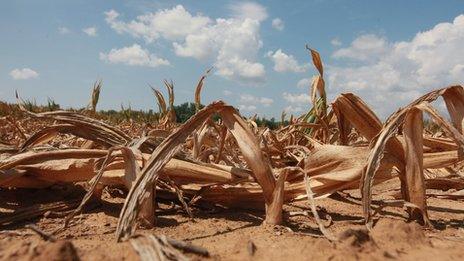UK's future climate to be all sorts
- Published
- comments
The BBC's Science Editor David Shukman takes a look at how rain in the air is calculated through a radar system
British winters are likely to become milder and wetter like the last one but cold spells still need to be planned for, says the UK Met Office.
Summers are likely to be hotter and drier, but washouts are still on the cards, it adds.
The assessment of future weather extremes finds the role of human influence is "detectable" in summer heatwaves and in intense rainfall.
However, the Met Office says a lot more work must be done to confirm the links.
The study has been released before a major new international climate report next week.
That report, to be produced by the Intergovernmental Panel on Climate Change, will look at the likely future impacts of global warming.
If the British assessment sounds confusing, you are not alone.
Assuming the Met Office study is correct (and its forecast runs out to the end of the century), it means everything from gumboots to snowploughs and sunscreen to anoraks will still be needed.
As the report's authors themselves readily admit, the British weather varies so "hugely year to year due to natural processes" that detecting trends is tough, and detecting a manmade fingerprint even harder.
'Fickle path'
Stephen Belcher, head of the Met Office Hadley Centre, sums it up like this: "We've got to continue living with the cold events and we've got to get used to the hot events."
He points out that a warmer atmosphere can hold more moisture, and that the most intense downpours seem to have become more frequent over the past 50 years - what the report calls the changing "character" of British rainfall.
But that does not guarantee that we will definitely see an increased number of storms in the future.
The British Isles are not only tucked beside a vast Atlantic Ocean whose temperatures have a powerful effect on our weather, they are also at the receiving-end of the jetstream. And this fast-flowing "river of wind" drives storms our way along a fickle path that remains poorly understood - it's an "inherently chaotic" factor, according to Prof Belcher.
The Met Office study is timed to coincide with the start of the final negotiations of the IPCC's Working Group II report, external.
The scientists and officials involved in that task are closeted in Yokohama.
While that report will assess the latest science on the possible impacts of climate change on a global scale, the Met Office has tried to do the same for Britain.
'Honest' assessment
After the record-breaking downpours of the last winter, the question of the role of climate change has shot up the political agenda so what do the experts say?
A key conclusion is that the "role of human influence" can be detected in temperature extremes, but changes in storminess and rainfall rates need more research.
What this means is that some types of weather are easier to assess than others - and temperature has always been more straightforward than precipitation.
So the authors are pretty confident that average and maximum temperatures look set to rise - and that our greenhouse gases have increased the odds of heatwaves like the one in 2003.
They are slightly less confident that winters such as 2010-11 will become more likely - and that humans have had a role in this.
But as for the last winter, and the wet summer of 2012 and the dry summer of 2010, the conclusion is honest: it is "too early to say" whether our activities have changed the odds of similar events happening again.
The report makes clear that global trends do not necessarily apply to Britain.
For example, it says that while there are connections between climate change and dry seasons in some parts of the world, "there is currently no clear evidence of such a link to recent dry periods in the UK."
So, lots of uncertainty remains - and the scientists are hoping that bigger computers and better models will help provide clearer answer in future.
- Published25 March 2014

- Published25 March 2014